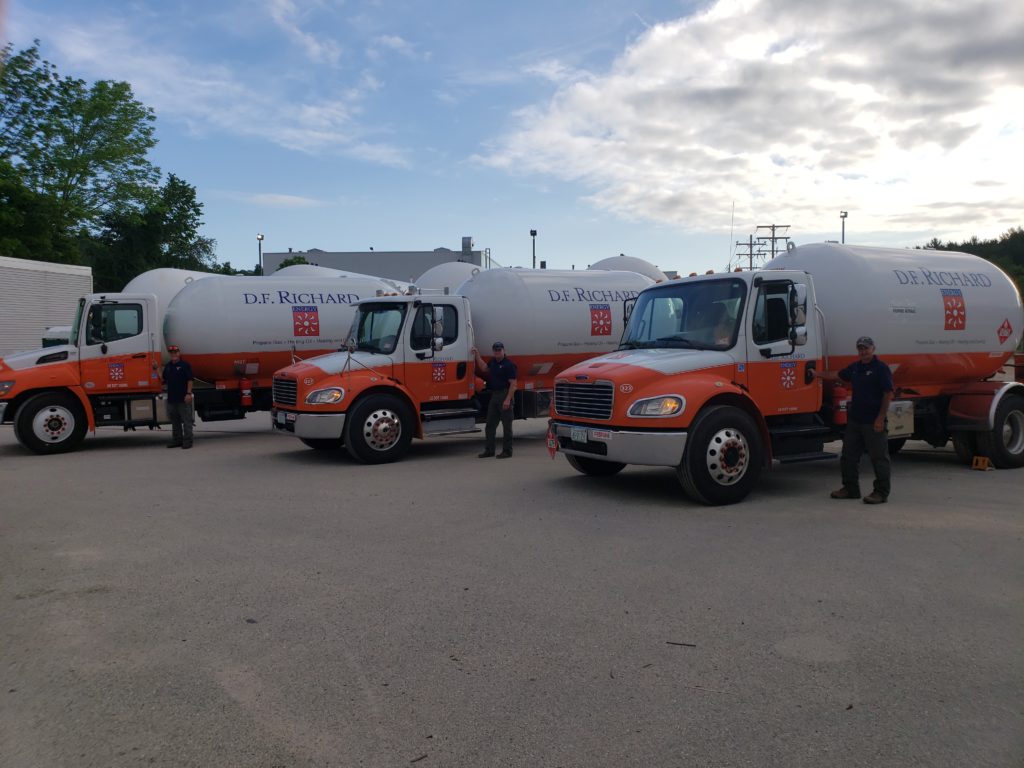CHS Builds Propane Business in Northeast
Despite the conversion of commercial and home heating systems to natural gas in recent years, U.S. Census Bureau data show that, throughout Maine and the East Coast region, propane use is on the rise—a trend that CHS responded to by building a terminal in Biddeford, Maine, in 2012 and, more recently, expanding it.
“A little over three years ago, CHS doubled the capacity of the Biddeford terminal to help increase performance and growth and meet the needs of our customers,” says Eric Brandt, Northeast sales manager. “In the last six years, CHS has doubled the volumes sold at the Biddeford terminal, much of that growth occurring after the facility expansion.” CHS also offers what it calls a “Propane-Powered Rebate Program” that is available to all marketers that purchase its wholesale product. Based in Inver Grove Heights, Minn., CHS is a global agribusiness owned by farmers, ranchers and cooperatives across the U.S.

Rebates are offered to marketers for adopting propane-powered technologies, participating in training, and making investments in autogas infrastructure. “As propane exports continue to increase, autogas represents one of the strongest opportunities to help keep propane gallons in the United States,” says Andy Ernst, marketing manager for CHS Propane. “While residential home heat and agriculture are strong markets, there are opportunities for the industry to advance in exciting new propane-powered technologies, like autogas, irrigation systems and generators.”
The rebate program is designed to help marketers grow their gallons by overcoming infrastructure barriers, and raising consumer awareness of the range of uses for propane. “The rebate program is flexible and offers marketers strong options, so they can take advantage of rebates that work best with the needs of their community. Marketers will receive $0.01 for every gallon of CHS wholesale propane purchased,” Ernst says. Rebates can be used for autogas dispensers, conversion kits, school bus or fleet conversions, generators and irrigation engines, and training or grant-writing support.
According
to the U.S Census Bureau, between 2012 and 2017, seven
states in the New England and Central Atlantic regions, as well as the District
of Columbia, recorded the highest percentage growth in the number of occupied
housing units in which the most-used heating fuel is propane. The states are Rhode
Island, Maine, Connecticut, Massachusetts, New York, New Hampshire, and
Pennsylvania. Vermont and Maryland also saw gains.
The Biddeford terminal is one of several initiatives CHS Propane has taken to
increase its supply assets, including a multiyear marketing agreement for more
than 80 million gallons a year from a large gas plant facility in North Dakota,
as well as securing additional company-owned railcar loading assets to
strengthen the company’s overall supply capability.
At the time of the terminal construction in Biddeford, Drew Combs, vice president of propane at CHS (and then chairman of the Propane Education and Research Council) said, “CHS invested in this terminal as an important step in fulfilling our company’s aspiration to expand our energy platform, meet customers’ needs and add value to our member-owners.” With over 180,000 gallons of storage, and two loading bays, the terminal features modern automation and safety technologies. Its purpose is to help retailers serve New England homeowners and businesses by offering a safe, reliable and competitively priced supply of propane garnered primarily from North American sources.
And that’s just what D.F. Richard Energy in Dover, N.H., has been experiencing as a retailer using the terminal, says Chief Operating Officer Ryan Jackson. The family-owned company has been providing propane gas service to its customers in New Hampshire and Maine for more than 80 years. Today it provides propane gas and Bioheat, as well as heating and cooling systems, serving some 15,000 customers. “Some of these customers are propane only, some are heating oil only, and others are both products,” Jackson says. “Ninety-five percent of our customers are residential propane/heating oil customers, with the other five percent being commercial propane users.”
The Biddeford terminal provides an additional supply point to an area that is traditionally difficult to serve, due to rail logistics, says Brandt of CHS. The terminal is a “manned and scheduled” terminal; CHS tracks how much product and capacity the terminal has each day, a practice designed to make for efficient loading. “Our customers do not have to worry about delays or waiting in line,” Brandt says. Eliminating such operational dysfunctions “increases trucking efficiency, saving them time and money,” Brandt says.
The Biddeford terminal is geographically convenient for marketers in the area, especially those in the southern portions of Maine and New Hampshire. D.F. Richard’s customers are all within a 30- to 35-mile radius of the company’s corporate office in Dover. There has been some small natural gas expansion in the company’s distribution area, but the propane market continues to grow as new homes are built or heating oil systems are replaced with propane systems for central heat and hot water.
As part of its propane distribution process, D.F Richard uses tank monitors to improve delivery efficiency and reduce or eliminate run-outs. “There has not been much interest directed by the customer, but we use them to increase our efficiencies on specific amounts,” Jackson says. D.F Richard Energy is currently using Gaslog, tank monitoring technology by Silicon Controls, distributed by propane equipment wholesaler Bergquist Inc., based in Toledo, Ohio.
Jackson says the Gaslog system has an open architecture and modular components that adapt to most gas and liquid distribution business needs. The system includes field equipment and remote communications, with web-based applications and gateways for integration with back office applications. Specifically, Gaslog’s telemetry system provides continuous logging of gas and liquid levels, usage, pressure, temperature and other status information from remote locations. “We have been using Gaslog for about eight years,” Jackson says, “and will continue to increase the number of devices we have on their platform.”
And while D.F. Richard Energy delivers propane to its growing customer base, the company continues its longstanding home heating oil business. “Our business originally started as a home heating oil business in 1932,” Jackson says. “We expanded into the propane market in the 1950s as a cylinder refilling dealer and split into the bulk delivery of propane to homes and businesses in the 1960s. We also offer our fuel-buying customers a full HVAC department that is able to take care of any of their HVAC service or installation needs.” Safety and security are top of mind for Jackson and his team, as well as others who turn to the Biddeford terminal for propane. Within the terminal, safety is paramount for employees as well. Brandt says the terminal has many safety systems in place that are designed to ensure the safety of personnel onsite and in the broader community. The terminal is equipped with flammable gas detectors throughout, as well as flame detectors in the truck loading area, he notes. The system is designed with positive grounding control, a design feature meant to ensure that sparks are not inadvertently created during truck loading, and all shutdown systems are linked to an automated callout system to alert CHS of an issue during periods when the facility is unattended.—Maura Keller




